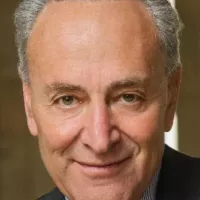Ron Wyden is the senior U.S. Senator from Oregon since 1996 and previously served in the House of Representatives. As a Democrat with libertarian leanings, he is known for advocating privacy rights, internet freedom, and limiting government surveillance. He currently serves as the ranking member of the Senate Finance Committee and is a prominent voice for civil liberties, especially concerning digital rights.
1995: Publicly supported same-sex marriage
In late 1995, Ron Wyden became the first U.S. Senate candidate (and then senator) to publicly support same-sex marriage.
1996: Voted against the Defense of Marriage Act
In 1996, Ron Wyden was one of just 14 senators to vote against the Defense of Marriage Act.
1997: Opposed Oregon Death with Dignity Act
In 1997, Ron Wyden personally opposed assisted suicide and voted against the Oregon Death with Dignity Act each time it appeared on the ballot by voter referendum.
2000: Blocked attempts to overturn Oregon assisted-suicide law
In 2000, Ron Wyden blocked attempts in Congress to overturn the Oregon assisted-suicide law by threatening a filibuster.
January 2001: Joined the Senate Intelligence Committee
In January 2001, Ron Wyden joined the Senate Intelligence Committee.
2001: Urged Bush not to alter Oregon law
In 2001, Ron Wyden wrote to President George W. Bush urging him not to alter the Oregon Death with Dignity Act through federal executive action.
November 10, 2005: Voted for Amendment no. 2516
On November 10, 2005, Ron Wyden was one of five Senate Democrats who joined 44 Republicans in voting for Amendment no. 2516, which ruled that enemy combatants did not have the right to Habeas Corpus.
2005: Filed amicus brief in support of Oregon's Death with Dignity Act
In 2005, Ron Wyden and four other Democratic members of Oregon's congressional delegation filed an amicus brief in the Supreme Court case of Gonzales v. Oregon in support of the State of Oregon, and praised the eventual decision to uphold the law.
2006: Informed Senate leadership he would block legislation overturning the Death with Dignity Act
In 2006, Ron Wyden informed Senate leadership that he would block legislation overturning the Death with Dignity Act.
2006: Voted against reauthorizing the Patriot Act
In 2006, Ron Wyden was one of 10 senators to vote against reauthorizing the Patriot Act.
June 2007: Voted in favor of declaring English the official language of the United States
In June 2007, Ron Wyden was among the minority of Democrats to vote in favor of declaring English the official language of the United States.
2007: Sponsored the Stop Arming Iran Act
In 2007, Ron Wyden and Representative Gabby Giffords sponsored the Stop Arming Iran Act, which would have barred the Defense Department from selling surplus F-14 parts and prohibited buyers who had already acquired surplus Tomcat parts from exporting them in order to prevent Iran from acquiring the parts.
2009: Vowed to continue fighting attempts to block the Death with Dignity Act
In 2009, Ron Wyden said that he would continue to "fight tooth and nail" to block new federal attempts to block the Oregon Death with Dignity Act.
December 2010: Voted for the Don't Ask, Don't Tell Repeal Act
Despite undergoing tests in advance of prostate surgery, Ron Wyden appeared in the Senate chamber in December 2010 to vote for the Don't Ask, Don't Tell Repeal Act of 2010.
2011: Criticized the rush to reauthorize the Patriot Act
In 2011, with the expiration of the Patriot Act approaching and efforts to reauthorize it intensifying, Ron Wyden and Merkley sharply criticized the rush to pass the bill and expressed particular concern about a provision allowing law enforcement authorities to collect a vast array of business records.
2012: Quoted Keith B. Alexander's keynote speech at DEF CON
In 2012, during a United States Senate Select Committee on Intelligence hearing, Ron Wyden quoted NSA director Keith B. Alexander's keynote speech at DEF CON.
January 2013: Commented on the scope of potential assassinations of American citizens
In January 2013, during an interview for the documentary Dirty Wars: The World is a Battlefield, Ron Wyden commented that the American people would be extraordinarily surprised if they could see the difference between what they believe a law says and how it has actually been interpreted in secret.
March 12, 2013: Questioned James Clapper about NSA data collection
On March 12, 2013, during a Senate Select Committee on Intelligence hearing, Ron Wyden questioned James Clapper about whether the NSA collects any type of data at all on millions or hundreds of millions of Americans.
June 2013: Noted Clapper's office was given opportunity to amend response
Following news of Snowden's leaks, in June 2013, Ron Wyden noted that Clapper's office had been provided with the question a day in advance of the hearing and was given the opportunity following Clapper's testimony to amend his response.
2013: Concerns stemmed from top-secret information
In 2013, Ron Wyden's concerns stemmed from top-secret information he had learned as a member of the Senate Intelligence Committee, a position he'd held for a dozen years by 2013, but he was bound by secrecy rules.
2014: Edward Snowden mentions James Clapper lie under oath to congress
In 2014, during a television interview, Edward Snowden stated that the breaking point for him was seeing the director of national intelligence, James Clapper, directly lie under oath to Congress.
October 2015: Unveiled a new gun control campaign
In October 2015, Ron Wyden was one of the Senate Democrats to unveil a new gun control campaign in the aftermath of the Umpqua Community College shooting, focusing on increasing background check requirements, closing loopholes on background checks, and closing the pipeline of illegal guns.
January 2016: Called for a hearing on funding for gun violence research
In January 2016, Ron Wyden was one of 18 senators to call on the appropriations committee leadership to hold a hearing on funding for gun violence research at the CDC and spoke with other Democratic senators and researchers supporting federal funding for investigation into gun violence prevention.
May 2017: Introduced the Equality Act of 2017
In May 2017, Ron Wyden was one of 46 senators to introduce the Equality Act of 2017, which aimed to ensure that every LGBT person can live their lives free from the fear of discrimination.
July 2017: Voted for the Countering America's Adversaries Through Sanctions Act
In July 2017, Ron Wyden voted for the Countering America's Adversaries Through Sanctions Act that placed sanctions on Iran, Russia and North Korea.
September 2017: Signed letter charging FCC with failing to provide opportunity to comment on net neutrality changes
In September 2017, Ron Wyden was one of nine senators to sign a letter to Federal Communications Commission Chairman Ajit Pai that charged the FCC with failing "to provide stakeholders with an opportunity to comment on the tens of thousands of filed complaints that directly shed light on proposed changes to existing net neutrality protections."
March 2018: Signed letter lambasting proposal to curb Lifeline program benefits
In March 2018, Ron Wyden was one of 10 senators to sign a letter spearheaded by Jeff Merkley lambasting a proposal by Pai that would curb the scope of benefits from the Lifeline program, which provides access to high-speed internet for poor communities.
March 2018: Expressed intent to pass bans on bump stocks and assault rifles
In March 2018, at a town hall, Ron Wyden answered in the affirmative when asked if he intended to pass bans on bump stocks and assault rifles. He also expressed optimism about the chances of passing national gun legislation.
August 2018: Cosponsored a resolution urging Trump to respect the press
In August 2018, Ron Wyden cosponsored a resolution urging President Trump to respect the press, after the White House barred CNN reporter Kaitlan Collins from covering an open press event following her repeated questions to Trump about his relationship with Michael Cohen.
September 2018: Signed letter urging more multifactor authentication measures
In September 2018, Ron Wyden was one of five senators to sign a letter to United States Secretary of State Mike Pompeo urging him to employ more multifactor authentication measures in order to secure the State Department's information systems.
October 2018: Signed letter urging reversal of policy on visas for same-sex partners
In October 2018, Ron Wyden was one of 20 senators to sign a letter to Secretary of State Mike Pompeo urging him to reverse the rollback of a policy that granted visas to same-sex partners of LGBTQIA+ diplomats.
February 2019: Signed a letter calling for a hearing on universal background checks
In February 2019, Ron Wyden was one of 38 senators to sign a letter to Senate Judiciary Committee Chairman Lindsey Graham calling on him to "hold a hearing" on universal background checks.
December 2020: Renewed calls for mandatory security reviews for software
In December 2020, in light of the 2020 United States federal government data breach, Ron Wyden renewed calls for the introduction of mandatory security reviews for software used by federal agencies.
July 9, 2024: Requested special counsel to investigate Justice Thomas
On July 9, 2024, it was reported that Ron Wyden and Senator Sheldon Whitehouse had sent a letter the previous week to Attorney General Merrick Garland, requesting the appointment of a special counsel to investigate Supreme Court Justice Clarence Thomas for tax and ethics violations.
Mentioned in this timeline

Donald John Trump is an American politician media personality and...

Chuck Schumer is the senior United States Senator from New...

Barack Obama the th U S President - was the...

Elizabeth Warren is a prominent American politician and the senior...

George W Bush the rd U S President - is...

Lindsey Graham is an American politician and attorney He has...
Trending

35 minutes ago Ex-Advisor Convicted of Defrauding Jrue Holiday and Other NBA Players

35 minutes ago Jalen Johnson injured in first quarter, Hawks win; questionable for Blazers game.

8 days ago Jonathan Kuminga Expected to Debut for Hawks Against Wizards, Frustrating Warriors Fans.

2 hours ago Donovan Clingan Ejected After Flagrant Foul During Blazers vs Grizzlies Game

2 hours ago Derrick White wins Eastern Conference Defensive Player of the Month for Celtics.

2 hours ago OG Anunoby's character revealed and scores 21 points against the Milwaukee Bucks.
Popular

Ken Paxton is an American politician and lawyer serving as...

Hillary Diane Rodham Clinton is a prominent American politician lawyer...

Jesse Jackson is an American civil rights activist politician and...

Jim Carrey is a Canadian-American actor and comedian celebrated for...

Bill Clinton served as the nd U S President from...

XXXTentacion born Jahseh Dwayne Ricardo Onfroy was a controversial yet...
